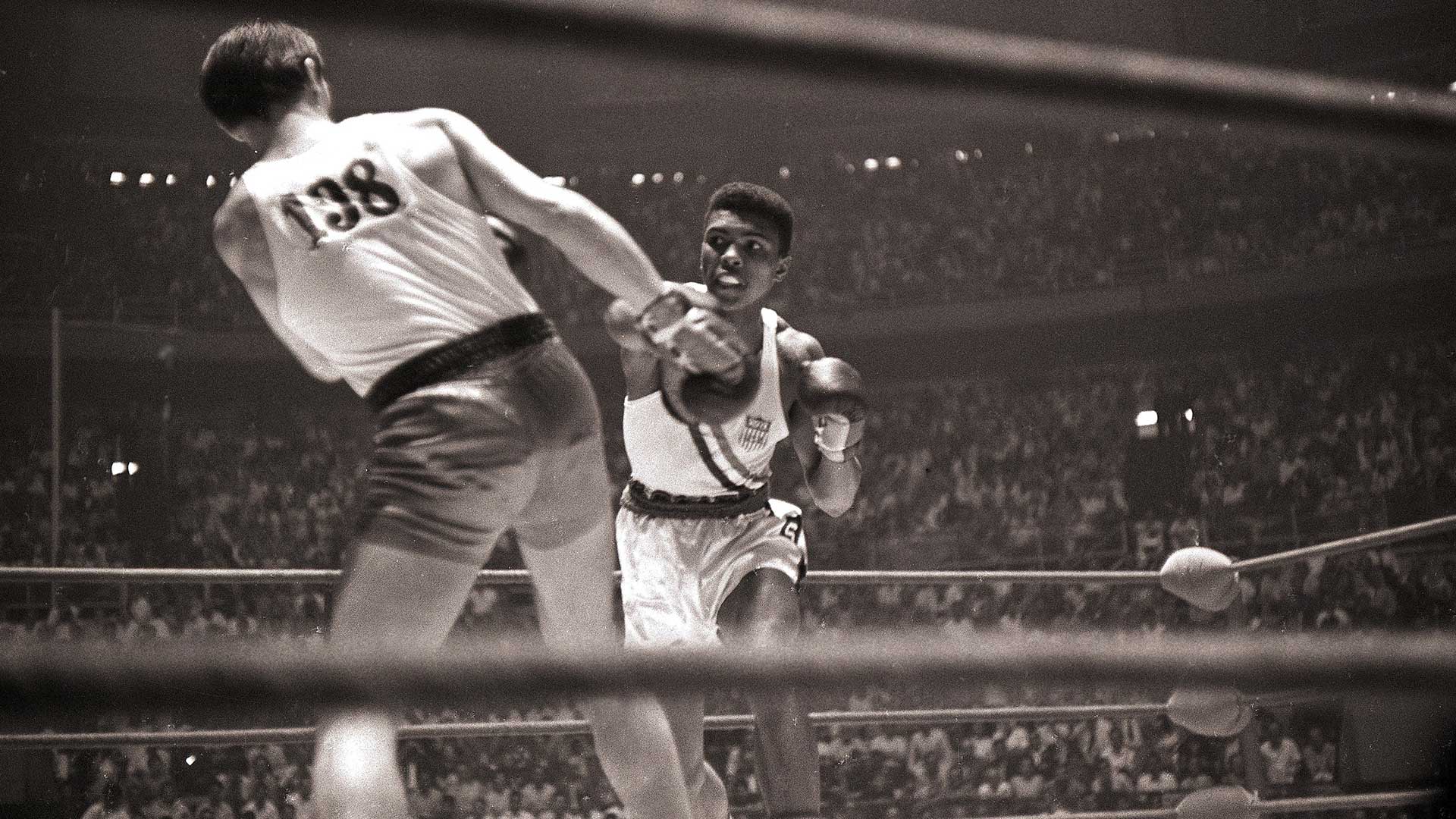September 4
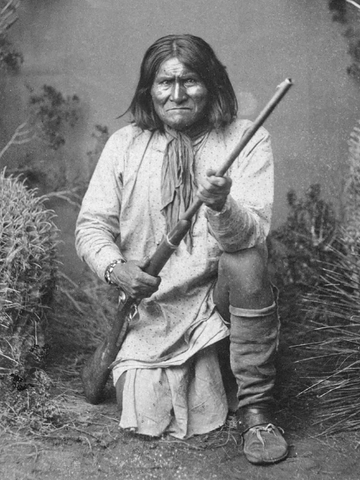
1886
Apache leader Geronimo surrendered to U.S. government troops. For 30 years, the Native American warrior had battled to protect his tribe’s homeland; however, by 1886 the Apaches were exhausted and hopelessly outnumbered. General Nelson Miles accepted Geronimo’s surrender, making him the last Native American warrior to formally give in to U.S. forces and signaling the end of the Indian Wars in the Southwest. Geronimo and a band of Apaches were sent to Florida and then Alabama, eventually ending up at the Comanche and Kiowa reservation near Fort Sill, Oklahoma Territory. There, Geronimo became a successful farmer and converted to Christianity. He participated in President Theodore Roosevelt's inaugural parade in 1905. The Apache leader dictated his autobiography, published in 1906 as Geronimo’s Story of His Life.

1957
Arkansas governor Orval Faubus enlists the National Guard to prevent nine African American students from entering Central High School in Little Rock. Faubus took the action in violation of a federal order to integrate the school. The conflict set the stage for the first major test of the U.S. Supreme Court’s unanimous 1954 decision in Brown v. Board of Education of Topeka that racial segregation in educational facilities is unconstitutional. On September 24, President Dwight Eisenhower sent 1,000 U.S. troops to Little Rock. The next day, the African American students entered under heavily armed guard. The episode served as a catalyst for the integration of other segregated schools in the United States.


2002
Kelly Clarkson, a 20-year-old cocktail waitress from Texas, won the first season of American Idol in a live television broadcast from Hollywood's Kodak Theater. Judged by Simon Cowell, Paula Abdul and Randy Jackson, American Idol became one of the most popular TV program in US history and spawned a slew of talent-competition shows. Future alumni would include Carrie Underwood, Jennifer Hudson, Adam Lambert and many more. Following Clarkson’s Season One victory, subsequent American Idol winners—including Ruben Studdard, Fantasia Barrino, Carrie Underwood, Taylor Hicks, Jordin Sparks and David Cook—have had varying degrees of success in their music careers.
September 5

1836
Sam Houston was elected president of the Republic of Texas, which earned its independence from Mexico in a successful military rebellion. Though the rebellion suffered a blow at the Alamo in early 1836, Houston was soon able to turn his army’s fortunes around. On April 21, he led some 800 Texans in a surprise defeat of 1,500 Mexican soldiers under General Antonio Lopez de Santa Anna at the San Jacinto River. An armistice was signed, which granted Texas its freedom. Houston served as the republic’s president until 1838, then again from 1841 to 1844. He helped Texas win admission to the United States and was elected as one of the state’s first two senators. As the Civil War loomed, Houston argued unsuccessfully against secession, and was deposed from office in March 1861 after refusing to swear allegiance to the Confederacy.


1960
Cassius Clay beat 3-time European champion Zbigniew Pietrzykowski of Poland by unanimous points decision to win Olympic light heavyweight boxing gold medal at the Rome Games. Cassius Clay arrived at the Rome 1960 Olympic Games as a relatively unknown 18-year-old and breezed through the competition. He would his eventually convert to Islam and change is name to Muhammad Ali. Ali's boxing career began just six years before his Rome appearance. Ali had thought that winning Olympic gold would improve the rampant racism back in American but, on his return, he found things to be much the same. After being declined service at a restaurant because he was an African American, he was so angry that he is said to have thrown his gold medal into a river.


1975
President Ford survived an attempt on his life in Sacramento. The assailant, a petite, red haired, freckle-faced young woman named Lynette Fromme, approached the president while he was walking near the California Capitol and raised a .45 caliber handgun toward him. Before she was able to fire off a shot, Secret Service agents tackled her and wrestled her to the ground. Nicknamed “Squeaky,” Fromme was a member of the notorious Charles Mason family. Fromme herself was still so enamored of Manson that she devised the plot to kill President Ford in order to win Manson’s approval. Fromme was convicted of attempted murder and was sentenced to life in prison in West Virginia. She escaped in 1979, but was caught within 25 miles of the prison. She was released in 2009.
September 6


1916
Piggly Wiggly, America’s first self-service grocery store, was founded in Memphis, Tennessee by Clarence Saunders. Piggly Wiggly’s introduction of self-service grocery shopping revolutionized the grocery industry. Saunders’ reason for choosing the intriguing name Piggly Wiggly remains a mystery; he was curiously reluctant to explain its origin. One theory is that it is derived from the nursery rhyme, “This little piggy went to market..." Piggly Wiggly Corporation secured a patent on the self-service format and issued franchises to hundreds of grocery retailers. These franchised stores were constructed to Saunders’ rigid specifications, operated on a strictly cash basis, and maintained a high standard of quality and cleanliness. Today, there are over 600 Piggly Wiggly® stores servicing communities in 17 states.

1975
18-year-old rising tennis star Martina Navratilova asked for political asylum in the United States after defecting from communist Czechoslovakia. She became a US citizen in 1981. Widely considered among the greatest tennis players of all time, Navratilova won 18 major singles titles, 31 major women's doubles titles, and 10 major mixed doubles titles, for a combined total of 59 major titles, the most in the Open Era. Alongside Chris Evert, her greatest rival, Navratilova dominated women's tennis in the 1970s and 1980s. She won her last major title, the mixed doubles crown at the 2006 US Open, shortly before her 50th birthday, and 32 years after her first major title in 1974. Navratilova—one of the first openly gay athletes—was inducted into the International Tennis Hall of Fame in 2000.

1995
Baltimore Orioles shortstop Cal Ripken Jr. played in his 2,131st consecutive game, breaking “Iron Horse” Lou Gehrig’s record for most consecutive games played. “The Iron Man” was credited with reviving interest in baseball after a 1994 work stoppage forced the cancellation of the World Series and soured fans on the national pastime. Ripken went on to play 2,632 games in a row before ending the streak by voluntarily removing himself from a game against the New York Yankees on September 19, 1998. Ripken retired after the 2001 season with the lifetime record for home runs by a shortstop (345) and a record for fielding percentage by a shortstop in a season (.9956, 1990). He played in 19 All-Star Games, and was awarded the All-Star MVP in 1991 and in his last All-Star Game in 2001, in which he hit a solo home run. He was elected to the Baseball Hall of Fame in 2007.
September 7

1813
The United States gets its nickname, Uncle Sam. The name is linked to Samuel Wilson, a meat packer from Troy, New York, who supplied barrels of beef to the US Army during the War of 1812. Wilson stamped the barrels with "U.S." for United States, but soldiers began referring to the grub as "Uncle Sam's." In the late 1860s and 1870s, political cartoonist Thomas Nast began popularizing the image of Uncle Sam. Nast continued to evolve the image, eventually giving Sam the white beard and stars-and-stripes suit that are associated with the character today. The most famous image of Uncle Sam was created by artist James Montgomery Flagg. In Flagg’s version, Uncle Sam is pointing straight ahead at the viewer. During WWI, this portrait of Sam with the words “I Want You For The U.S. Army” was used as a recruiting poster.

1921
In Atlantic City, New Jersey, the first Miss America Pageant, a two-day event, was held. The origins of the "Miss America Pageant" lie in an event entitled The Fall Frolic which was held on September 25, 1920, in Atlantic City and designed to bring business to the Boardwalk. 350 "young maidens" were pushed along a parade route in wicker chairs. The event was so successful that The Businessmen's League planned to repeat it the following year as a beauty pageant. The 16-year-old winner from Washington, D.C., Margaret Gorman, was recognized as the first "Miss America" when she returned the next year to defend her title.

1996
Actor and hip-hop recording artist Tupac Shakur was shot several times in Las Vegas, Nevada, after attending a boxing match. Shakur was riding in a black BMW with Death Row Records founder Marion “Suge” Knight when a white Cadillac sedan pulled alongside and fired into Shakur’s car. Knight was only grazed in the head, but Shakur was hit several times. He died in a hospital several days later. Although Shakur’s killer was never identified, some believe Orlando Anderson, a member of the Los Angeles gang Southside Crips, was responsible. Earlier in the evening, prior to the Mike Tyson-Bruce Seldon heavyweight fight, Anderson had been attacked in the lobby of the MGM Grand Hotel by a group from Death Row Records, including Suge Knight.
September 8

1965
Iconic series "Star Trek" premiered on NBC. The show lasted for three seasons and followed the crew of the starship USS Enterprise as it completed its missions in space in the 23rd century. Captain James T. Kirk -- along with half- human/half-Vulcan science officer Spock, ship Dr. "Bones" McCoy, Ensign Pavel Chekov, communications officer Lt. Nyota Uhura, helmsman Lt. Hikaru Sulu and chief engineer Lt. Cmdr. Montgomery "Scotty" Scott -- confront strange alien races, friendly and hostile alike, as they explore unknown worlds.

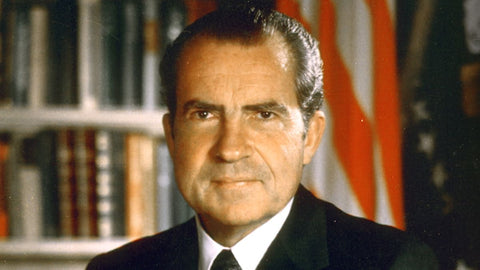
1974
In a controversial executive action, President Gerald Ford pardoned his disgraced predecessor Richard M. Nixon for any crimes he may have committed or participated in while in office. Ford later defended this action before the House Judiciary Committee, explaining that he wanted to end the national division created by the Watergate scandal. Decades later, the John F. Kennedy Library Foundation presented its 2001 Profile in Courage Award to Gerald Ford for his 1974 pardon of Nixon. In pardoning Nixon, said the foundation, Ford placed his love of country ahead of his own political future and brought needed closure to the divisive Watergate affair. Ford left politics after losing the 1976 presidential election to Democrat Jimmy Carter. Ford died on December 26, 2006, at the age of 93.

1986
The Oprah Winfrey Show was broadcast nationally for the first time. A huge success, her daytime television talk show turned Winfrey into one of the most powerful, wealthy people in show business and, arguably, one of the most influential women in America. In 2008, The Oprah Winfrey Show had an estimated weekly audience of some 46 million viewers in the United States and was broadcast around the world in 134 countries. Winfrey wields enormous influence when it comes to promoting products: A recommendation on her show could turn a book, movie or just about anything else into a bestseller, a phenomenon that has been dubbed the “Oprah Effect.” The show ended in May 2011; several months after Winfrey launched the Oprah Winfrey Network (OWN).
September 9

1850
Though it had only been part of the United States for less than two years, California became the 31st state in the union (without ever even having been a territory). Mexico had reluctantly ceded California and much of its northern territory to the United States in the 1848 Treaty of Guadalupe Hidalgo. When the Mexican diplomats signed the treaty, they saw California as a region of sleepy mission towns with a tiny population of about 7,300-not a devastating loss to the Mexican empire. However, gold had been discovered at Sutter’s Mill in Coloma, California, nine days before they signed the peace treaty. Suddenly, the greatest gold rush in history was on, and “forty-niners” began flooding into California chasing after the fist-sized gold nuggets rumored to be strewn about the ground just waiting to be picked up. California’s population and wealth skyrocketed.

1956
The King of Rock and Roll teamed up with TV’s reigning variety program when Elvis Presley appeared on “The Ed Sullivan Show” for the first time. After earning big ratings for “The Steve Allen Show,” the Dorsey Brothers “Stage Show” and “The Milton Berle Show,” Sullivan finally reneged on his Presley ban, signing the controversial singing star to an unprecedented $50,000 contract for three appearances. With 60 million viewers—or 82.6 percent of TV viewers at the time—tuning in, the appearance garnered the show’s best ratings in two years and became the most-watched TV broadcast of the 1950s.

1967
Sergeant Duane D. Hackney is presented with the Air Force Cross for bravery in rescuing an Air Force pilot in Vietnam. He was the first living Air Force enlisted man to receive the award, the nation’s second highest award for bravery in action. He was the most decorated enlisted man in USAF history and the recipient of 28 decorations for valor in combat and more than 70 awards and decorations in all. He served in the Air Force from 1965 to 1991, retiring as a Chief Master Sergeant.
September 10
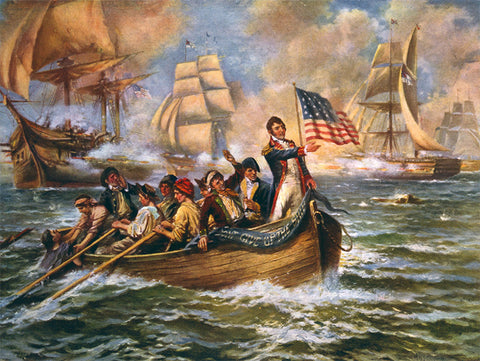
1813
The Battle of Lake Erie marked the first unqualified defeat of a British naval squadron in history. U.S. Captain Oliver Hazard Perry leads a fleet of nine American ships to victory over a squadron of six British warships during the War of 1812. The battle was closely contested for hours, and Perry’s flagship Lawrence was reduced to a defenseless wreck. He then transferred to the Niagara and sailed directly into the British line, firing broadsides and forcing the British to surrender. Perry had won a complete victory at the cost of 27 Americans killed and 96 wounded; British casualties were 40 dead and 94 wounded. The Battle of Lake Erie forced the British to abandon Detroit, ensuring U.S. control over Lake Erie and the territorial northwest.
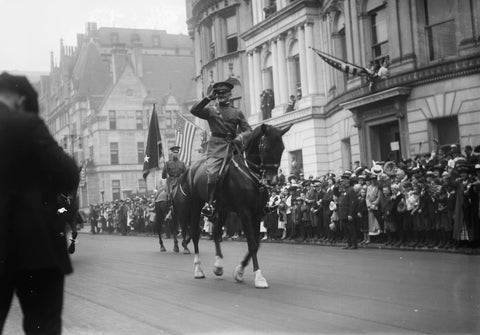

1919
Nearly a year after the end of World War I, known at the time as the Great War, Gen. John J. Pershing led a victory parade down New York City’s Fifth Avenue. Crowds cheered as 25,000 U.S. soldiers who had served in the American Expeditionary Force’s 1st Division on the Western Front marched from 107th Street to Washington Square in Greenwich Village, wearing trench helmets and full combat gear. Though the U.S. was initially able to muster only about 100,000 men to send to France under Pershing’s command, President Woodrow Wilson swiftly adopted a policy of conscription. By the time the war ended on November 11, 1918, more than 2 million American soldiers had served on the battlefields of Western Europe, and some 50,000 of them had lost their lives.


1991
Nirvana’s “Smells Like Teen Spirit” was released. In just a few short months, the group evolved from a complete mainstream music nonentity to become the most important rock band on earth. “Smells Like Teen Spirit” was released quietly and without significant promotion in the hopes that it would begin building awareness of the new album, Nevermind, among listeners to college and alternative radio. Kurt Cobain, Nirvana’s guitarist, lead singer and primary songwriter, had to be talked into even including “Smells Like Teen Spirit” on Nevermind by his bandmates bassist Krist Novoselic and drummer Dave Grohl.






